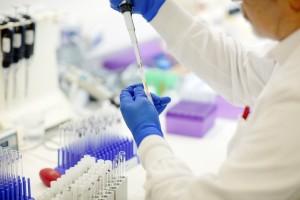-
Florida
Mayo Clinic Receives $6 Million for ALS, FTD Research
 JACKSONVILLE, Fla. — The National Institute of Neurological Disorders and Stroke (NINDS) and the U.S. Department of Defense have awarded researchers at Mayo Clinic’s campus in Jacksonville approximately $6 million in two grants to further their studies aimed at improving the diagnosis and treatment of patients suffering from either amyotrophic lateral sclerosis (ALS) or Lou Gehrig’s disease and frontotemporal dementia (FTD).
JACKSONVILLE, Fla. — The National Institute of Neurological Disorders and Stroke (NINDS) and the U.S. Department of Defense have awarded researchers at Mayo Clinic’s campus in Jacksonville approximately $6 million in two grants to further their studies aimed at improving the diagnosis and treatment of patients suffering from either amyotrophic lateral sclerosis (ALS) or Lou Gehrig’s disease and frontotemporal dementia (FTD).
NINDS has awarded Leonard Petrucelli, Ph.D., chair of the Department of Neuroscience, and his colleagues Kevin Boylan, M.D., Rosa Rademakers, Ph.D., and Dennis Dickson, M.D., a five-year P01 grant (P01 NS084974-1) to combine their expertise in neurology, genetics, neuropathology and cell biology. Given that no biomarker or blood test currently exists for clinicians to definitely diagnose ALS or FTD, the funding will allow researchers to improve understanding of C9ORF72-related neurodegeneration, identify potential biomarkers and therapeutic targets, and develop a biological fluid and tissue resource to aid future drug discovery.
MEDIA CONTACT: Kevin Punsky, Mayo Clinic Public Affairs, 904-953-0746.
Email: punsky.kevin@mayo.edu
The grants come on the heels of two groundbreaking discoveries made by neuroscientists at Mayo Clinic in Jacksonville. In 2011, Dr. Rademakers identified an unusual mutation — a short DNA sequence repeated and expanded hundreds to thousands of times — in the C9ORF72 gene. This expanded repeat sequence in the C9ORF72 gene is the most common cause of familial ALS, a major cause of familial FTD, and is also found in people with ALS or FTD who report no family history of either disorder.
In 2013, Dr. Petrucelli uncovered a potentially new therapeutic target and biomarker, termed c9RAN proteins, in ALS and FTD associated with the C9ORF72 repeat expansion. The c9RAN proteins are generated only when the mutation is present making them unique to patients with “c9FTD/ALS.”
“The P01 grant award is a testament to the quality of our patient-driven research, which is enabling our team to identify factors that determine disease severity and potential biomarkers that would be detectable in c9FTD/ALS patients,” says Dr. Petrucelli.
More than 30,000 Americans live with ALS, a condition that destroys motor neuron cells that control essential muscle activity such as speaking, walking, breathing and swallowing. Statistics show that veterans of the U.S. military are twice as likely to develop ALS than the general public. After Alzheimer’s disease, frontotemporal dementia is the most common form of early onset neurodegenerative dementia. It is characterized by changes in personality, behavior and language due to loss of gray matter in the brain’s frontal lobe.
With the support of Mayo Clinic’s ALS Association Certified Center of Excellence, investigators will conduct longitudinal studies incorporating clinical, neuropsychological and motor function in people with ALS and their family members to analyze whether changes in the levels of potential biomarkers correlate with symptoms, and if biomarker levels change as disease progresses. Researchers will also establish whether c9RAN proteins are toxic in cell models and the role of other genetic mutations in the disease.
The Department of Defense also recently awarded Dr. Petrucelli and his collaborators at The Scripps Research Institute and University of Massachusetts a one-year, $400,000 grant to develop a new therapeutic strategy for ALS. By targeting abnormal cellular processes caused by the C9ORF72 mutation and the generation of toxic ribonucleic acid (RNA) species, the researchers aim to identify chemical compounds that bind to the RNA before it can form abnormal clumps and disrupt nerve cell function. They hypothesize that by therapeutically targeting the RNA, thereby preventing the formation of abnormal RNA clumps in brain cells and the secondary production of c9RAN proteins, they can combat cell death and the associated disease symptoms c9FTD/ALS patients suffer.
About Mayo Clinic
Recognizing 150 years of serving humanity in 2014, Mayo Clinic is a nonprofit worldwide leader in medical care, research and education for people from all walks of life. For more information, visit 150years.mayoclinic.org, MayoClinic.org or newsnetwork.mayoclinic.org/.
###







